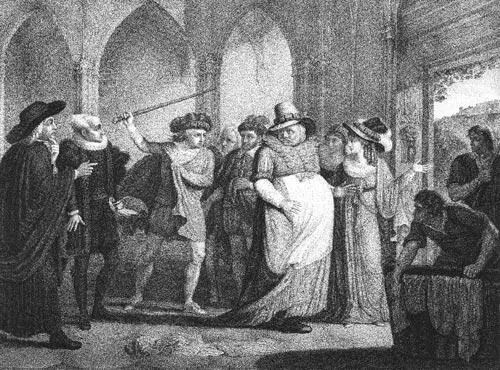[Exit.]
1. Serv. Come, come, take it up.
2. Serv. Pray heaven it be not full of knight again.
1. Serv. I hope not, I had lief as bear so much lead.
[Enter] Ford, Page, Caius, Evans, Shallow.
Ford. Ay, but if it prove true, Master Page, have you any way then to unfool me again? Set down the basket, villain! Somebody call my wife. Youth in a basket! O you panderly rascals, there’s a knot, a [ging], a pack, a conspiracy against me. Now shall the devil be sham’d. What, wife, I say! Come, come forth! Behold what honest clothes you send forth to bleaching!
Page. Why, this passes, Master Ford. You are not to go loose any longer, you must be pinion’d.
Evans. Why, this is lunatics! this is mad as a mad dog!
Shal. Indeed, Master Ford, this is not well indeed.
Ford. So say I too, sir.
[Enter Mistress Ford.]
Come hither, Mistress Ford, Mistress Ford, the honest woman, the modest wife, the virtuous creature, that hath the jealious fool to her husband! I suspect without cause, mistress, do I?
Mrs. Ford. Heaven be my witness you do, [and] if you suspect me in any dishonesty.
Ford. Well said, brazen-face! hold it out. Come forth, sirrah!
[Pulling clothes out of the basket.]
Page. This passes!
Mrs. Ford. Are you not asham’d? Let the clothes alone.
Ford. I shall find you anon.
Evans. ’Tis unreasonable! Will you take up your wive’s clothes? Come away.
Ford. Empty the basket, I say!
Mrs. Ford. Why, man, why?
Ford. Master Page, as I am a man, there was one convey’d out of my house yesterday in this basket. Why may not he be there again? In my house I am sure he is. My intelligence is true, my jealousy is reasonable. Pluck me out all the linen.
Mrs. Ford. If you find a man there, he shall die a flea’s death.
Page. Here’s no man.
Shal. By my fidelity, this is not well, Master Ford; this wrongs you.
Evans. Master Ford, you must pray, and not follow the imaginations of your own heart. This is jealousies.
Ford. Well, he’s not here I seek for.
Page. No, nor no where else but in your brain.
Ford. Help to search my house this one time. If I find not what I seek, show no color for my extremity; let me for ever be your table-sport. Let them say of me, “As jealous as Ford, that search’d a hollow walnut for his wive’s leman.” Satisfy me once more, once more search with me.
Mrs. Ford. What ho, Mistress Page! come you and the old woman down; my husband will come into the chamber.
Ford. Old woman? What old woman’s that?
Mrs. Ford. Why, it is my maid’s aunt of Brainford.
Ford. A witch, a quean, an old cozening quean! Have I not forbid her my house? She comes of errands, does she? We are simple men, we do not know what’s brought to pass under the profession of fortune-telling. She works by charms, by spells, by th’ figure, and such daub’ry as this is, beyond our element; we know nothing. Come down, you witch, you hag you, come down, I say!
Mrs. Ford. Nay, good, sweet husband! Good gentlemen, let him [not] strike the old woman.
[Enter Falstaff disguised like an old woman, and Mistress Page with him.]
Mrs. Page. Come, Mother Prat, come give me your hand.
Ford. I’ll prat her. Out of my door, you witch, you rag, you baggage, you poulcat, you runnion! out, out! I’ll conjure you, I’ll fortune-tell you!
[Ford beats him, and he runs away.]
Mrs. Page. Are you not asham’d? I think you have kill’d the poor woman.
Mrs. Ford. Nay, he will do it.—’Tis a goodly credit for you.
Ford. Hang her, witch!
Evans. By yea and no, I think the oman is a witch indeed. I like not when a oman has a great peard. I spy a great peard under his muffler.
Ford. Will you follow, gentlemen? I beseech you follow; see but the issue of my jealousy. If I cry out thus upon no trail, never trust me when I open again.
Page. Let’s obey his humor a little further. Come, gentlemen.
[Exeunt Ford, Page, Shallow, Caius, and Evans.]
Mrs. Page. Trust me, he beat him most pitifully.
Mrs. Ford. Nay, by th’ mass, that he did not; he beat him most unpitifully, methought.
Mrs. Page. I’ll have the cudgel hallow’d and hung o’er the altar; it hath done meritorious service.
Mrs. Ford. What think you? May we, with the warrant of womanhood and the witness of a good conscience, pursue him with any further revenge?
Mrs. Page. The spirit of wantonness is sure scar’d out of him. If the devil have him not in fee-simple, with fine and recovery, he will never, I think, in the way of waste, attempt us again.
Mrs. Ford. Shall we tell our husbands how we have serv’d him?
Mrs. Page. Yes, by all means; if it be but to scrape the figures out of your husband’s brains. If they can find in their hearts the poor unvirtuous fat knight shall be any further afflicted, we two will still be the ministers.
Mrs. Ford. I’ll warrant they’ll have him publicly sham’d, and methinks there would be no period to the jest, should he not be publicly sham’d.
Mrs. Page. Come, to the forge with it, then shape it. I would not have things cool.
Exeunt.
¶
 James Durno , p. — Thomas Ryder , e.
James Durno , p. — Thomas Ryder , e.
Enter Host and Bardolph.
Bard. Sir, the [Germans desire] to have three of your horses. The Duke himself will be to-morrow at court, and they are going to meet him.
Host. What duke should that be comes so secretly? I hear not of him in the court. Let me speak with the gentlemen; they speak English?
Bard. Ay, sir; I’ll call [them] to you.
Host. They shall have my horses, but I’ll make them pay; I’ll sauce them. They have had my [house] a week at command. I have turn’d away my other guests; they must come off. I’ll sauce them, come.
Exeunt.
¶
Enter Page, Ford, Mistress Page, Mistress Ford, and Evans.
Evans. ’Tis one of the best discretions of a oman as ever I did look upon.
Page. And did he send you both these letters at an instant?
Mrs. Page. Within a quarter of an hour.
Ford.
Pardon me, wife, henceforth do what thou wilt.
I rather will suspect the sun with [cold]
Than thee with wantonness. Now doth thy honor stand,
In him that was of late an heretic,
As firm as faith.
Page.
’Tis well, ’tis well, no more.
Be not as extreme in submission as in offense;
But let our plot go forward. Let our wives
Yet once again (to make us public sport)
Appoint a meeting with this old fat fellow,
Where we may take him, and disgrace him for it.
Ford.
There is no better way than that they spoke of.
Page. How? to send him word they’ll meet him in the park at midnight? Fie, fie, he’ll never come.
Evans. You say he has been thrown in the rivers, and has been grievously peaten as an old oman. Methinks there should be terrors in him that he should not come; methinks his flesh is punish’d, he shall have no desires.
Читать дальше

 James Durno , p. — Thomas Ryder , e.
James Durno , p. — Thomas Ryder , e.










